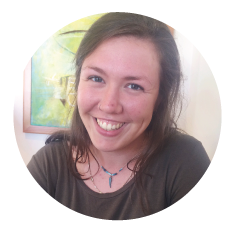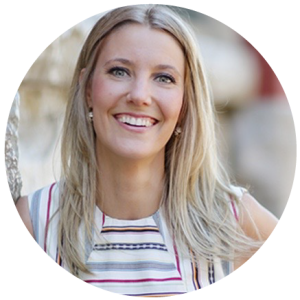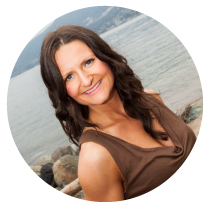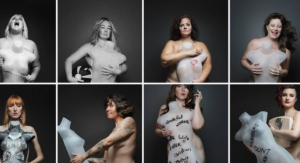By Jenna Spowart
Words are a weapon. Words are medicine. Words can be cruel. Words can be beautiful. The power of language is a gift and a tool entrusted to humanity, and it took a lead role in many of the lessons I learned at this year’s Looking Glass Summer Camp. My head, once filled by constant noise, was quieted by the stillness and sacredness of camp. Space once filled by my own wild attempts to make sense of life was replaced with clarity and truth by those who recognized my humanness.
As I drove down the long and winding dirt road to Loon Lake (this was my first time at camp), my body was in panic mode. My palms were sweaty, heart raced, my stomach upset. My mind, though, was calm. I looked forward to the week, already daydreaming about what was to come. It was as if my mind and body did not belong together, constantly at war and arguing about what this week would be all about. Would camp be triggering or would it bring some of the healing and routine that I’d forgotten how to prioritize? I am pleased to report that it was the latter.
Even though I had worried relentlessly about being one of the oldest campers, about whether or not I really needed this week at camp, and constantly questioned how much personal growth was possible in such a short period of time, I arrived at camp and instantly felt waves of peace wash over me. This was a safe space, with safe people. Nerves lingered, but my guard came crashing down.
It wasn’t long before the destructive voice in my head confronted me at dinner that first night. I quickly realized that camp as a “safe space” didn’t mean this week would be easy. It meant that I would be supported and loved as I moved through everything from art projects to the high ropes course, from forest adventures to yoga on the dock, and from overwhelming emotions to sitting in discomfort. The destructive part of my mind took a swing at me immediately, and with force. I was bombarded with a silent string of doubts and questions.
Why are you struggling with dinner? Are you sure you’re struggling? Look at others around you, they’re probably having a harder time than you. You’re just doing this for attention. You can function in daily life; you don’t need meal support. Get over it.
Completely overwhelmed, I sat eating dinner and simultaneously wondering how I would endure the week. I was caught off guard by these thoughts that weren’t about the food itself. Instead they had peeled back a few layers and attacked my doubts and emotional triggers. I didn’t realize it then, but even by sitting in the dining hall with other campers and staff, I was already taking a stand to this bully in my head and isolating destruction itself. Without the distractions of my phone, homework, and the stresses of daily life, I couldn’t help but hear these negative thoughts, but with the support all around me, I couldn’t help but do something about it. If words are powerful, then I could not afford to listen to lies. The magic of camp, having faith that I would catch on eventually, did not wait to be noticed before weaving itself in and throughout each moment. Tough meals and emotional conversations didn’t end, but I became far more resilient. I was reminded that everything I needed was already inside of me. Tears and laughter became increasingly cathartic, and I welcomed both.
Days at camp seemed to last forever and slip away just as quickly. There is something indescribably divine about spending time in nature and being fully present with other people who accept you just as you are. I remembered how much I love canoeing, and yoga, and connecting with others on such a genuine level. I realized it had been years since I allowed myself to take up this much emotional and spiritual space. Whether I created space for myself, or someone else held it for me, there was room for every part of me. The cringe-worthy memories, the much-regretted past, the victories, the tsunami tears, honesty, fear, laughter, dreams for the future, and who I am in the moment. What I am most grateful for, however, is the tribe surrounding me. I didn’t celebrate anything alone; there were always others cheering right beside me. In the space where I unknowingly judged myself or held any skewed perception of recovery, someone else was there to reframe it for me. Here are some of my favourite gems from the week:
It was suggested to me, metaphorically speaking, that I end this chapter and start a whole new book. I cannot move forward with who I was yesterday. I cannot strive to help the person I was five years ago. I need to start with the person I am today, because she is worthy of love and growth and recovery.
I was encouraged to move forward without a definition of recovery, and with openness to ambiguity. This is scary, but so is a life searching for answers when there aren’t any.
Through many tearful conversations I learned that I need to forgive myself. As I work on mending certain relationships in my life, I must not show up as anything more or less than human. This means that I deserve the same amount of grace that everyone else does, no matter how much I’ve received in the past.
One of my favorite phrases repeated through the week was from one leader who would always say “Guess what day it is?”. The answer, we quickly learned, was, “It’s a great day to be alive!” Although it was said multiple times most days, I didn’t appreciate it until about day four of camp. At first it just seemed like a silly, cheesy little statement. But as it was continually repeated, I realized that maybe I ought to pay attention. It became a necessary part of each day, a joyful truth spoken into my life. I would have never learned to appreciate it if I’d only heard it one or two times.
They say that when you are learning a new language, you have a better chance of becoming fluent if you are fully immersed in it. Time in the classroom is necessary. Dictionaries, worksheets, and references are helpful. But to be immersed in a language, in a culture, is what solidifies what was once foreign. My week at camp this summer was exactly that. Immersion in a language I was forgetting how to speak. I shared my heart and I was honest, but I struggled when I couldn’t find the words to explain my way through the tough moments. Instead, I had to feel my way through and let others do the talking. They spoke the language of love. Self love. Forgiveness. A lack of judgement. Jumping in the lake, just because. Holding space. Crying. Bravery. Facing fears. Speaking up. Listening. Being. Recovering. Living. Summer camp is not forever, but I will hold it close to my heart for the rest of my life.

Jenna is a poet, musician, and a lover of deep connection with others. She recently graduated from Trinity Western University with a degree in Psychology, and is passionate about supporting others along their own unique paths of recovery and healing. This desire stems from Jenna’s gratitude toward those who walk alongside her in her own recovery. Jenna finds comfort in vanilla chamomile tea, walking barefoot outdoors, and hugs.
[vc_row][vc_column][vc_column_text][printfriendly]
By Kaela Scott
Q: I am heading back to school this year and am worried about maintaining my recovery when I am under all that stress. Any thoughts?
A: I love this question and in large part because simply asking and being worried about this very valid concern means you are already taking steps to prevent a relapse. Truthfully in these situations, awareness is key. School likely will be stressful. There is a lot of pressure to do well and a lot of demand on your time that you may have otherwise used to focus on your wellbeing.
School is a stressor for many people. Exams, papers, labs all can leave us feeling overwhelmed and anxious. While I would like to say that there is a trick to having a stress-free year, the reality is that stress is a part of life and we have to learn how to deal with it in effective, healthy ways.
One of the most important things you can do to manage your recovery while under stress is to get into a routine. When we look at people who typically do really well in their recovery, they started by creating a routine for themselves that focused on their recovery goals, self care and the other responsibilities they have (school, work, friends etc). The important thing to remember here is that your routine needs to be balanced. Focusing only on school means you will neglect your recovery and yourself. Focusing only on your recovery will likely cause you to get behind in your studies.
[dt_quote type="pullquote" layout="right" font_size="big" animation="none" size="16"]One of the most important things you can do to manage your recovery while under stress is to get into a routine.[/dt_quote]
To have a successful and balanced year, spend some time looking at what you want to prioritize and how much time you think each piece will require. Recovery needs to be a focus, not only because stress can often cause us to resort to destructive coping mechanisms, but also because school will be that much more difficult mentally, physically, and emotionally if your recovery slips.
If self-care and balance remain a priority then recovery will be easier. We have to make time and space to focus on being well. There will, of course, be moments when it is difficult to prioritize time off because you have an exam or a paper due. You don’t want to expect mastery and perfection from yourself. Instead, you want to know that you will follow your routine for the most part and that you can be flexible without changes in your routine being a threat to your recovery. Keeping a healthy mindset that we can tackle stress and maintain our recovery is really important.
School in itself is one way of working on setting yourself up to have a successful and happy life. Continuing to keep your recovery at the forefront during your studies, and doing what it takes to keep moving towards your recovery goals, is another important piece of achieving the healthy life that you want.
[/vc_column_text][/vc_column][/vc_row][vc_row][vc_column][vc_column_text]
[/vc_column_text][/vc_column][/vc_row][vc_row][vc_column][vc_column_text]
[dt_divider style="thin" /]
 Kaela Scott is a Registered Clinical Counsellor who specializes in Eating Disorders. She runs her own private practice and works with the Looking Glass Foundation in both their summer camp and their Hand In Hand Program. She has been passionate about working with eating disorders since freeing herself from her own struggle and realizing what it is like to be happy and well. When she isn’t working, you can find Kaela either cozying up with a cup of tea and her friends or up in the mountains going for a hike.
Kaela Scott is a Registered Clinical Counsellor who specializes in Eating Disorders. She runs her own private practice and works with the Looking Glass Foundation in both their summer camp and their Hand In Hand Program. She has been passionate about working with eating disorders since freeing herself from her own struggle and realizing what it is like to be happy and well. When she isn’t working, you can find Kaela either cozying up with a cup of tea and her friends or up in the mountains going for a hike.
[/vc_column_text][/vc_column][/vc_row]
[vc_row][vc_column][vc_column_text][printfriendly]
By Kaela Scott
Q: How do I allow my supports into my recovery process?
A: One of the most common issues when someone is struggling with an eating disorder is often self-enforced isolation. One of the most important pieces of recovery is letting others in so we can heal and move towards a healthy recovered life. So how do we bridge the gap between eating disorder driven isolation and recovery focused support systems?
Having a healthy, consistent and encouraging support team is one of the greatest factors in recovery. We need people to help guide us and to remind us of our goals when it feels like the eating disorder voice is screaming at you and trying to make you stay loyal to its demands. The first step in allowing people into your recovery process is getting clear on who you feel will be able to support in a healthy, helpful manner. Sometimes, even those closest to us, who may love us most, may not be the best people to include in the vulnerable journey towards recovery. Getting clear on who you want to be involved in your journey means you know exactly who to turn to in your moments of need (and when the eating disorder is trying to keep you isolated).
Once you know who you want to share your journey with, I think one of the healthiest things you can do is ask for some time to check in with them about some things that have been coming up for you. By doing this you create space to actually have a conversation about what you have been struggling with and the person on the receiving end will be more present. Talking about it out of the blue can sometimes catch people off guard and result in their answers not always being as sensitive as we need. Sharing your experiences takes a lot of courage and you want to set yourself, and your support, up to be as successful as possible.
When we begin to share our story, I think it is important to reflect on what pieces you want to share first and what boundaries you need in place. For example, you may want to just let them know that you have been struggling to begin with and set the boundary that you don’t want to be overwhelmed with questions right off the bat? Or perhaps you want to share your story some place safe (your apartment, your favourite path by the water etc) and at a particular time of the day. Maybe you want them to know just how vulnerable you are feeling and that they need to be really gentle in how they connect with you during that time. Perhaps you want to talk to each person separately, or maybe all at once.
You also want to brace yourself for the fact that your support system may have a reaction to your story. For many it may be really sad to know you are in pain, while others may marvel in your courage to share your feelings and the struggle you are facing with your disorder. Your supports are human and while the process needs to be predominantly focused on you, it’s important that you don’t deny them their own feelings.
Finally, it is critical that you learn to ask for what you need from them going forward. Maybe it is asking to have a meal with someone a few times a week so you can ensure you are meeting your recovery goals. Or maybe it is by giving yourself permission to take up space when you feel you are overwhelmed with all the emotions and anxiety that comes up. By asking for what you need your supports know how to show up. If you don’t, not only will you feel really disappointed if they don’t meet your needs but it is likely that your eating disorder will continue to put barriers between you and your recovery.
[/vc_column_text][/vc_column][/vc_row][vc_row][vc_column][vc_column_text]
[/vc_column_text][/vc_column][/vc_row][vc_row][vc_column][vc_column_text]
[dt_divider style="thin" /]
 Kaela Scott is a Registered Clinical Counsellor who specializes in Eating Disorders. She runs her own private practice and works with the Looking Glass Foundation in both their summer camp and their Hand In Hand Program. She has been passionate about working with eating disorders since freeing herself from her own struggle and realizing what it is like to be happy and well. When she isn’t working, you can find Kaela either cozying up with a cup of tea and her friends or up in the mountains going for a hike.
Kaela Scott is a Registered Clinical Counsellor who specializes in Eating Disorders. She runs her own private practice and works with the Looking Glass Foundation in both their summer camp and their Hand In Hand Program. She has been passionate about working with eating disorders since freeing herself from her own struggle and realizing what it is like to be happy and well. When she isn’t working, you can find Kaela either cozying up with a cup of tea and her friends or up in the mountains going for a hike.
[/vc_column_text][/vc_column][/vc_row]
By The Looking Glass Foundation
What is recovery?
If you’ve ever suffered from an eating disorder, or supported someone who has, chances are you’ve asked yourself this question – many times.
The question was the focus of lively conversation among a diverse mix of attendees at the first of our three-event Summer Dialogue Series on June 24th. With such a range of experiences and perspectives around eating disorders, there was a lot of debate about what recovery is and looks like, and just how achievable it is.
We began with nailing whatever “absolutes” we could agree on – the things that could be said, unequivocally, about recovering from an eating disorder:
Of course, the conversation generated lots of other questions and issues. Many who were early on in recovery wondered who they would be once they reached the other side. Others who were further along in their journey questioned whether one really ever gets to a point of being fully recovered. Still others expressed frustration with how long it takes and how much effort is involved. And those in the room who were years past their eating disorder were shocked to learn that although research and treatment methods have progressed, the fight against this disease still has a long way to go. Eating disorders are on the rise, more than ever before.
Together, we sifted through all that came up and settled on three questions to help us drill down a little deeper:
[dt_quote type="pullquote" layout="right" font_size="big" animation="none" size="2.0em"]It isn’t enough to want to be recovered. We have to be willing to put ourselves through the process of recovering.[/dt_quote]

In small groups, we explored these questions in depth, unfurling threads and themes that were sometimes personal, uncomfortable, dark even. The light of it was that we were able to challenge one another’s perspectives and assumptions in a cohesive, supportive way. We gave each other a safe space to be.
A few more reflections from the afternoon:
We endured the pain of our suffering; we can endure the discomfort of our recovery.
So, you tell us – what does recovery mean to you? Share your thoughts on our Facebook page.
Upcoming events in our Summer Dialogue Series are: What is a Healthy Body? on July 22nd and What is a Meaningful Life? on August 26th. For more information visit https://www.lookingglassbc.com/dialogue-series/
By Alicia Putinski
As we anticipate the arrival of summer, something that can become thought consuming, is the idea of being beach body ready.
Bodies are meant to come in all shapes and sizes. The diet industry tries to persuade us that there is a certain body type to strive for to be beach body ready, and they push for it to be accomplished in a short period of time. Fitness advertising displays photos of bodybuilders in a physique that even they don't sustain. As such, society obtains a very warped perception of body image. An unsustainable body isn't a healthy body.
In my own experience, this type of thinking lead me to develop a restrictive eating disorder. I battled orthorexia for a long time because I was obsessed with becoming unrealistically lean. This eating disorder is very common amongst athletes and avid gym goers.
On the other side of my eating disorder, I developed acceptance and the desire to love my body. I now help other athletes and fitness enthusiasts improve their body image as a body confidence and emotional eating coach. I'd like to share some tips I provide to my clients about loving our bodies unconditionally.
Loving our bodies goes much deeper than looking in the mirror and admiring our reflection. Body love exists in the actions in which we take to honour, nourish and care for our bodies. These actions begin with our thoughts, feelings and emotions.
I often collaborate with clients to brainstorm what loving our bodies this way looks like in practice. Often we come up with answers such as:
 An exercise I recommend to those struggling with beach body image is to journal about their favourite aspects of summer in terms of feelings. We can really dive into small details that create great feelings such as the smell of the beach, the feeling we have when we put on our favourite flowy summer dress, or the way the sun feels against our skin. Note that we are recalling familiar comforting feelings that are in no relation to our appearance. From here, we can identify the emotions that these feelings create for us. The smell of the beach might make you feel excited, the feeling of wearing that dress might give you a sense of freedom, the sun against your skin might make you feel happy and safe. Whatever your good summer feelings and emotions are, highlight them. In real life practice after journaling, I ask others to become more mindful of their good summer feelings and the emotions surrounding them in the present moment. Perhaps they will discover new ones along the way too.
An exercise I recommend to those struggling with beach body image is to journal about their favourite aspects of summer in terms of feelings. We can really dive into small details that create great feelings such as the smell of the beach, the feeling we have when we put on our favourite flowy summer dress, or the way the sun feels against our skin. Note that we are recalling familiar comforting feelings that are in no relation to our appearance. From here, we can identify the emotions that these feelings create for us. The smell of the beach might make you feel excited, the feeling of wearing that dress might give you a sense of freedom, the sun against your skin might make you feel happy and safe. Whatever your good summer feelings and emotions are, highlight them. In real life practice after journaling, I ask others to become more mindful of their good summer feelings and the emotions surrounding them in the present moment. Perhaps they will discover new ones along the way too.
Always remember, we must feel to heal. Summer is a wonderful time to focus on good feelings. One more suggestion I have is to find your favourite summer song. Something that brings forth feelings of nostalgia and bliss, and listen to it as you gear yourself up for a summer that is focused around feeling good in your body.
 Alicia Putinski is an orthorexia-recovered life coach and the founder of Weightless Body Confidence Coaching. She is also a personal trainer specializing in strength and functional movement.
Alicia Putinski is an orthorexia-recovered life coach and the founder of Weightless Body Confidence Coaching. She is also a personal trainer specializing in strength and functional movement.
By Kat Bernards
I really didn't want to talk about this today.
In fact, most days I don't want to talk about this. I'm tired, frustrated, and quite frankly, bored talking about this. But this is a conversation that really needs to happen – because we live in a culture that perpetually shames, abuses, and harasses the bodies that inhabit it. And I can't afford to be sick and tired of talking about it, because the stakes are too high and we still have a lot of work to do together.
 This is what I'm going on about: A Canadian photographer named Julia Busato created a series of portraits featuring naked human beings posing behind a mannequin torso. The series challenges prototypical standards for beauty & body size, and subverts the destructive idea that 'one size fits all.' The full photo series is available on Busato's website, which is aptly titled Seeing Beauty in all Things, but the platform where she was gaining the most new views, shares, and feedback was -naturally- Facebook. Despite the fact that Busato's carefully curated Facebook gallery didn't contain a single ounce of nudity, some users flagged the images as “inappropriate,” and Facebook in its wisdom saw fit to remove several of the images and slap Busato with a temporary ban from accessing the site.
This is what I'm going on about: A Canadian photographer named Julia Busato created a series of portraits featuring naked human beings posing behind a mannequin torso. The series challenges prototypical standards for beauty & body size, and subverts the destructive idea that 'one size fits all.' The full photo series is available on Busato's website, which is aptly titled Seeing Beauty in all Things, but the platform where she was gaining the most new views, shares, and feedback was -naturally- Facebook. Despite the fact that Busato's carefully curated Facebook gallery didn't contain a single ounce of nudity, some users flagged the images as “inappropriate,” and Facebook in its wisdom saw fit to remove several of the images and slap Busato with a temporary ban from accessing the site.
This is where a “dislike” button might come in handy, Facebook.
Where, oh where, to begin with this one? The selective image removals, and whatever standard was used to deem only some of the bodies reprehensible while others were acceptable. The people who think they have the right to label another's body as unfit for social media consumption. The banning of an artist from using a website whose members wilfully exploit, harass, and humiliate each other in the name of free speech. The courage and vulnerability of the models to put themselves out there, only to be snarled in a trap of online human insecurities. Or, as my colleague Nicole pointed out, the absurd double-standard that enables celebrities like the Kardashians to post nude and semi-nude selfies, while allowing an angry, offended mob to decry a photographer's Art as something crude and profane.
The problem, of course, isn't the Kardashians and their ilk. It's the archaic, grotesque idea that any one of us has the right to literally snitch on another person's body because it doesn't look enough like a mannequin. Busato's series hosts a diverse range of bodies that vary in size, shape, skin colour, gender, and body art. The whole thing is celebratory, inclusive, and positive – unless, of course, you're offended by bodies that, to quote the artist herself, “don't fit in the mold.” Then it's a whole can of writhing, naked worms verging on the pornographic.
Seriously?
When we visit art galleries, museums, or the many plazas and places of worship worldwide that house ancient works displaying naked gods and mortals, do we rage and protest? I really hope not. Such works are often on view in some of the most sacred spaces we know. Churches, temples, monasteries, mosques, tombs – all of these spaces are associated with traditions whereby the nude human body in many different forms is considered worthy of our admiration, our respect, and our acceptance. How can something so sacred be manipulated into something so profane? Can Facebook and its subculture of malignantly ignorant users even recognize, let alone reconcile, the difference between these two concepts? Neither of these questions are rhetorical, yet I feel like I'm shouting them into a void.
I'm sure it comes as no surprise to many of us that the majority of the negative comments on Busato's Facebook page focus on the bigger bodies in the photo series. Acknowledge that bodies come in more than a few sizes, and cue the horde of vitriolic body-shaming sentiment unconvincingly disguised as mere concern for public health – as though a plastic, mannequin-based body ideal is somehow synonymous with health. But then there's shaming of the smaller bodies, too, because of the misguided claim that you need X many curves to ride the body-positive train. No matter how we try, as soon as we step forward to celebrate confidence and self-acceptance, others are there to demoralize, crying out that we have no right to love ourselves.
No matter how we try, as soon as we step forward to celebrate confidence and self-acceptance, others are there to demoralize, crying out that we have no right to love ourselves.
Enough is enough. Bodies are bodies. Shaming is shaming. We can't lock arms in our march for a post-recovery world if we're making up rules for exclusion. It is a fundamental truth that eating disorders, body dysmorphia, and body image issues are about so much more than food or exercise – they are about pain. It is unacceptable that Facebook, as an influential microcosm of our society, feels entitled to disregard that pain, and to dismiss a photo series that aims to help others overcome their own struggles, just to appease a subset of the population that wretchedly clings to the notion that bodies are for objectification only.
We need to re-personify our bodies. To reclaim them, unite them with our innermost expressions of beauty, and share them with the world according to our own authentic choices. No body is anathema, and each of us deserves to occupy our own body as a sacred space – free from the profanity of a body-snitching comments section.
To this end, what can we do as social media consumers and influencers to reshape this idea that our bodies are open to unwarranted scrutiny and discrimination? How can we legitimize our right to occupy space in the physical and digital world? We have a responsibility to ourselves and to our fellow human beings to raise the standard of acceptance instead of intolerance.

Kat recently graduated from Simon Fraser University with a degree in Psychology, and is thrilled to have joined the Looking Glass Foundation staff. She loves live music, theatre, writing, and singing when no one is listening.
[vc_row][vc_column][vc_column_text][printfriendly]
By Kirsten Kenward
Let’s discuss, shall we...
For me it all started off as an obsession with myself and my body. 'Improving' myself, 'improving' my body in order to fill some need I was unaware of at the time. A need that would take me years to become conscious of. At the time I believed I was ‘getting healthy’ in order to look better and to have people like me. Who has a similar story? Sadly, I’ve heard more than a few..
Looking back, it's easy to see that my rapid spiral into obsession with food and weight was caused by deeper motivations, but during the process it simply seemed like the only option. Life would be better if I was (insert body image related statement here).
As the years go by this way of thinking held on for dear life. Even as times of desperation and hospital-level sickness passed, the need to fulfill some ideal self-image remained. I no longer wanted to look like a stick figure pre-se, but I still couldn’t look at myself in the mirror with pride and affection. The remnants of the voice that once told me to move that piece of chicken to the other side of the plate for reasons still unknown to me or to stand up one last time while I’m trying to relax just to burn a few calories, had now morphed into an evil sidekick begging me to keep hating on myself. It's always there, haunting me further into self-hatred.
 I began to realize that perhaps it was this same voice that first told me life would be better 10 more pounds lighter. That even though now it tells me how I won't get that job because the other candidate is much more qualified (and thin btw)…it's still here. It's morphed into a different but no less harmful form. Except now, I’m meant to be a functioning member of society. A full human who has 'beat' an eating disorder and come out the other side. But, most times, I feel like a total imposter. Like I’m constantly hiding a dark secret that even if I were to share, no one would understand.
I began to realize that perhaps it was this same voice that first told me life would be better 10 more pounds lighter. That even though now it tells me how I won't get that job because the other candidate is much more qualified (and thin btw)…it's still here. It's morphed into a different but no less harmful form. Except now, I’m meant to be a functioning member of society. A full human who has 'beat' an eating disorder and come out the other side. But, most times, I feel like a total imposter. Like I’m constantly hiding a dark secret that even if I were to share, no one would understand.
So no, I don't know when it is appropriate to say "I'm cured from my ED". After 11 years, I can say that I no longer have the desire to starve or to have no body fat, but I still question my worth ALL OF THE TIME.
[dt_quote type="pullquote" layout="right" font_size="big" animation="none" size="10"]To be a light in the world, in the face of my inner darkness. And to embrace that this inherent fearful voice inside me, may never go away completely[/dt_quote]
My experience has morphed and through it I've changed into a totally different person than I was before I got sick. All I can do most days is to get through. To do my best to stay positive and be kind to myself. To be a light in the world, in the face of my inner darkness. And to embrace that this inherent fearful voice inside me may never go away completely; but at least I know I can survive and I can share, because my sisters out there will understand.
Because listen, what I’ve come to realize is that we’re all struggling, and no not just those who suffer from eating disorders, but all of us humans. We’re all fighting battles that we keep inside, hidden, and frightened of. If there is anything I’ve learned through my struggles and through my dark times, with and without ED by my side, it’s that compassion and love for others but most importantly for yourself, is the most important of all. Remember that it takes a great deal of time to build back trust with yourself, so do not rush that process. Be patient and be willing to face your demons head on, with kindness. And maybe one day, both you and I, will know that we can finally be okay, whether we are fully cured or not.
[/vc_column_text][/vc_column][/vc_row][vc_row][vc_column][vc_empty_space][vc_column_text]
 Born and raised in North Vancouver, Kirsten is inspired by nature and the diversity of cultures around her to write about what she sees and experiences. She has a Bachelor's Degree in History and English which she completed at the University of Toronto in 2012, though during this time struggled with anorexia and body dysmorphia. She plans to dedicate her life to awareness of mental and physical health and has been a certified Personal Trainer for over 4 years. She finds freedom and joy through physical endeavours of all kinds, as well as sharing her experiences through writing and dialogue.
Born and raised in North Vancouver, Kirsten is inspired by nature and the diversity of cultures around her to write about what she sees and experiences. She has a Bachelor's Degree in History and English which she completed at the University of Toronto in 2012, though during this time struggled with anorexia and body dysmorphia. She plans to dedicate her life to awareness of mental and physical health and has been a certified Personal Trainer for over 4 years. She finds freedom and joy through physical endeavours of all kinds, as well as sharing her experiences through writing and dialogue.
[/vc_column_text][/vc_column][/vc_row]
[vc_row][vc_column][vc_column_text][printfriendly]
By Carolyn Digby
There is no one personality type that is more susceptible to developing an eating disorder than others. There are common characteristics that many, including myself, seem to share. Being a people pleaser was one that contributed to my past struggles.
I hated confrontation (and still do to an extent), and tended to stay silent when confronted with a situation that I strongly disagreed with. This stemmed from the fact that I had a low self-esteem, and didn’t feel that my opinions mattered. I’d then become frustrated with myself for not saying anything, then slowly become more and more resentful, until one day I would inevitably burst at the subject seemingly out of nowhere.
 I’m not perfect and still have people pleasing tendencies, but over time I’ve learned to become more assertive when faced with disagreements and in my everyday life. A huge part of that was becoming more confident in myself, and acknowledging that my thoughts and opinions are valuable and worth being heard. It’s no fun to be a doormat, and people can sense and take advantage of that.
I’m not perfect and still have people pleasing tendencies, but over time I’ve learned to become more assertive when faced with disagreements and in my everyday life. A huge part of that was becoming more confident in myself, and acknowledging that my thoughts and opinions are valuable and worth being heard. It’s no fun to be a doormat, and people can sense and take advantage of that.
While it may not seem like much, there are a few tweaks here and there that can really help boost your confidence and make you more assertive. It is amazing that the power of having a small boost of self-esteem can do; feeling more confident can transcend into multiple areas of your life, and even the smallest things matter.
With that, here are five quick tips to becoming more assertive:
-Hey XXX! I just was hoping that maybe you could send the assignment to me at some point tonight 😊 I needed it this afternoon to make some changes, but oh well. When you have a moment!
-Hey XXX, can you please send me the assignment tonight? I needed it this afternoon.
While B looks blunt, you get the message across and you will more likely be taken seriously. Another quick tip on this: anytime you find yourself wanting to say "but", replace it with "and". "But" is one of those words that can really rob your initial message; once a "but" is added, the person then only hears what follows.
Slight changes go a long way! As Amy Cuddy says in her TEDtalk, “Fake it ‘til you become it”.
[/vc_column_text][/vc_column][/vc_row][vc_row][vc_column][vc_empty_space][vc_column_text]
Carolyn went to the University of Victoria for psychology, and is currently working towards applying for a Master's degree in the same subject. She hopes to uncover what sociological and personality aspects contribute to the development of eating disorders. Otherwise, Carolyn loves writing, drawing, travelling the world, and of course, her handsome cat.
[/vc_column_text][/vc_column][/vc_row]
By Lauren Kresowaty
Eating disorders affect many lives and can have long-lasting physical, psychological, and emotional consequences. Fortunately, many former ED sufferers will go on to live “normally”—pursuing higher education, careers, love, and family. Many recovered/recovering women who have struggled with eating disorders in the past will experience the numerous joys and pains of being pregnant and becoming mothers.
What we may not always anticipate are the numerous pregnancy-related triggers we may encounter as we navigate this new state of being, including triggers brought on by peers and care providers, and by our own constantly-changing bodies.
Our Bodies
For many former sufferers, pregnancy may actually offer a reprieve from post-ED stresses and pressures. Pregnancy and childbirth can help many women gain a new sense of respect for their bodies and the amazing things they are capable of (like nurturing a new human life). Some women find that the responsibility of carrying a developing fetus overrides their own anxieties about their bodies’ appearance. And many others simply find comfort in the fact that pregnancy is one of the very few times in a woman’s life that western society actually “allows” her to grow/be larger free from guilt (the idea that anyone needs societal permission to be comfortable with their own body is persistent and problematic, and deserves closer examination; but that’s for another time). All this is to say that pregnancy can, in fact, be a really nice time for people who have struggled with eating disorders.
 However, for those of us whose recovered/recovering state relies on a hard-won peace between the self and the body, achieved through the feelings of capability and well-being that accompany a specific exercise regimen/physical practice, nutritious diet, or a general sense of health and balance, the physical and hormonal changes that accompany pregnancy (especially early pregnancy) may feel like a betrayal. If you enjoy potentially high-impact or contact sports (like alpine skiing or rugby), you may have to give them up for the next 9+ months. Fatigue and nausea (sometimes severe) may prevent you from being as active as you’re used to, or prevent you from eating the way you want to (in my first trimester, my stomach couldn’t tolerate my favourite vegetables or fruits, and I had to subsist mostly on bland pastas and dry Cheerios). Despite your best intentions, a lot of how you will feel (and what you can do and eat) during pregnancy is going to come down to your hormones. These hormones will fluctuate and impact you in unpredictable ways, which can be very hard for women who crave control, or who have only recently learned to trust their bodies.
However, for those of us whose recovered/recovering state relies on a hard-won peace between the self and the body, achieved through the feelings of capability and well-being that accompany a specific exercise regimen/physical practice, nutritious diet, or a general sense of health and balance, the physical and hormonal changes that accompany pregnancy (especially early pregnancy) may feel like a betrayal. If you enjoy potentially high-impact or contact sports (like alpine skiing or rugby), you may have to give them up for the next 9+ months. Fatigue and nausea (sometimes severe) may prevent you from being as active as you’re used to, or prevent you from eating the way you want to (in my first trimester, my stomach couldn’t tolerate my favourite vegetables or fruits, and I had to subsist mostly on bland pastas and dry Cheerios). Despite your best intentions, a lot of how you will feel (and what you can do and eat) during pregnancy is going to come down to your hormones. These hormones will fluctuate and impact you in unpredictable ways, which can be very hard for women who crave control, or who have only recently learned to trust their bodies.
Our Peers
Nowadays, most of us should know that making unsolicited comments on women’s bodies is in poor taste. This polite notion flies right out the window, however, as soon as women become noticeably pregnant (or as soon as they tell their friends, family, colleagues, etc. about their pregnancy). A lot of the hoopla and excitement is harmless (folks trying to guess the gender of your fetus by how you “carry”, for example), but much of it is not. Comments about your belly (whether people think you are too small or too big for your gestational week), your size (whether you’ve gained weight on the rest of your body or not), your face (whether you’re “glowing” or “look tired”), intimate questions about how your body is handling your pregnancy and about your “cravings”, and the increased scrutiny you, your body, and your nutritional choices will be under can be very upsetting for any woman, never mind a woman with an ED history. Once again, the troubling idea of “societal permission” may come into play, with friends expressing jealousy that you’re “allowed” to eat whatever and as much as you want (even though that’s not necessarily true, depending on your pregnancy and medical condition). 707
While some one-off remarks (“Are you sure there’s just one in there?”) can occasionally be shrugged off, you may need to be assertive with your friends and family if you find their comments are getting to you. You have every right to say “That’s actually a bit inappropriate/rude,” or to gently remind your well-meaning but nosy mother/grandmother/aunt/in-law that you and your caregiver have everything well in hand, and that you are not interested in discussing your pregnancy and personal health with them. After all, while you are temporarily housing another being for a few months, your body belongs to YOU, and both you and your baby need for YOU to be okay, regardless of what others think.
Care Providers
For the most part, I’ve loved my midwifery team. I feel informed, cared for, and supported as I approach delivery and the big changes that lie ahead. That being said, care providers in pregnancy are, generally speaking, focused mostly on one aspect of you (that baby you’re carrying and how your body is handling it), and may not have as comprehensive an approach to you as a whole person. I was asked about and disclosed my ED history in my first midwifery appointment, so this information is in my file notes, however, since at the same time I also declared that I’m “fine now”, I haven’t found that any of my midwives have been particularly tuned in to this issue, especially when it came to discussion about gestational diabetes, which affects between 3 and 20% of pregnant women.
Fortunately, I did not screen positive for gestational diabetes, but I did still receive mini-lectures about cutting back on my sugar intake, including dire warnings about the “hidden sugars” in my favourite breakfast foods (I tried it their way and switched up my breakfast menu for a while, but I felt awful so I went back to what I know works for me). Although it was all very gentle and well-intentioned, I never take kindly to advice or edicts about “good” or “bad” food, and I resented being placed in a position where I was once again judging myself for and feeling guilty about my nutritional choices. For those women who do develop gestational diabetes, unfortunately the treatment/management of their glucose levels (which includes a fairly restricted diet) can be very triggering, especially if you’re trying to move away from micro-managing your food. Be sure to reach out for help if you’re not okay.
As with any care provider-patient relationship, you may sometimes need to be assertive and forthright with your care provider, and ask for what you need depending on where you are in your recovery journey. If you feel your doctor or midwife’s advice or admonitions are triggering ED-related behaviours and anxieties, you can ask them to dial it back. If they are unable or unwilling to work sensitively with your post-ED needs, you may want to switch care providers. You can also ask for referrals to specialists/therapists who are familiar with eating disorders and can help you navigate through the various minefields pregnancy may place in your path. Remember: resources do exist and you deserve to access whatever you need to be healthy.
The Good News
Pregnancy is not all gloom and hidden triggers! Pregnancy hormones can also bring about some very welcome (albeit temporary) changes as well. Personally, I’ve never felt as beautiful as I have since half-way through my second trimester—my skin is great, my hair is full and shiny, and for some reason I’ve barely needed to shave my legs (a bonus since they’re getting increasingly difficult to reach). I also have this big beautiful belly that says to the world, hey, look at me! My body is doing something amazing! Though every pregnancy is different, what binds them together is the truly miraculous biological event taking place in our bodies. Just one more reason they, and we, deserve our respect and care.

Lauren is a Vancouver writer and blogger, and currently a graduate student in the MA in Liberal Studies program at Simon Fraser University. She is excitedly awaiting the birth of her first child.
[vc_row][vc_column][vc_column_text][printfriendly]
By Nicole Keay

Even if we don't work in an office that has a water cooler, we can be sure that “water cooler conversations” are still taking place. These are the conversations you and your colleagues engage in when you’re taking a break from your work-related tasks. They take place in the lunchroom, your cubicles, at the printer, in meeting rooms, and on your afternoon trip to grab your caffeinated pick-me-up. They’re everywhere and they’re hard to avoid.
It’s natural to want to fit in and be liked in your workplace. It’s the place and the people we end up spending most of our week with. For that reason, we make friends with our colleagues; eat in the lunchroom when we’d rather sit at our desk; and take part in office potlucks and parties.
How to lose that last 10 lbs, summer bodies, the latest exercise and diet trends, juice cleanses ... the list of "water cooler" topics goes on. As women, we seem to bond over body talk. We reach a certain age and, like it’s some right of passage, we start hating and obsessing over our bodies. We’re automatically conditioned to do so by our culture and the media. Our conversations jump between dating, hobbies, career goals, and so on … but body talk always seems to sneak its way in. For most of us, that conversation is inherently negative.
I can’t speak to the male experience, but as a female who was suffering from an eating disorder, this environment was toxic. At first, these conversations seemed harmless, but for me, it quickly spiraled into something that not only made me feel like a farce, but also made me sicker.
My restrictive eating soon became a topic of conversation itself. Not about it being restrictive and unhealthy, but because it was envied. “You’re so good”, “I wish I had your discipline”, "You’re always so healthy” are what I heard on a regular basis. It was hard for me to hear praise around something that was a constant battle. My eating disorder, on the other hand, thrived on this newfound support. It used these comments as justification that what I was doing was not only healthy and accepted, but also downright desired.
I hid my excessive exercise behind marathon training. I had been injured from running excessively and not doing enough strength training. So I explained my frequent trips to the gym and yoga by proclaiming they were necessary to my training and to keeping me from further injury. All of which might have been totally normal if it weren’t for my eating disorder. There are people that run and train just the way I did; I ran with them. The difference is they fuelled their bodies properly and rested when they needed to. They didn't obsessively fixate on calories in versus calories out to lose weight or compensate for bingeing and purging. Of course, I made sure that no one saw that side, so to them, my “dedication” was inspiring.
The more praise that I received from colleagues, the more pressure I felt to maintain this identity. That pressure was two-fold:
I eventually did speak up and get help. I took a month off of work for inpatient treatment. When I returned, it was hard to adjust back without falling into old ways. I no longer felt like I belonged, I no longer knew my place. I had been that person in every workplace I had been in. It was my identity and my downfall because I didn’t know how to be that person in a healthy, positive way.
If this scenario seems all too familiar or you are just ready to move past the body-bashing, diet-focused BS and focus your time and thoughts elsewhere, here are a few suggestions to try:
It is highly unlikely that your efforts will change the minds of everyone you work with, or come in contact with. It will however, keep you from spiralling down that path. We have enough of a battle with our internal bullies that we don’t need to encourage others'. Keep your focus on putting a stop to your negative self-talk and body bashing. Keep your focus on your recovery. In the end, the freedom you feel will be so worth it.
[/vc_column_text][/vc_column][/vc_row][vc_row][vc_column][vc_empty_space][vc_column_text]
 Nicole is the Looking Glass Foundation's Communications Manager. Her passion for working with eating disorders comes from her own personal journey. By having authentic conversations and sharing our stories, Nicole believes that we can work to eliminate stigma by creating deeper awareness and understanding for eating disorders, and mental illness as a whole. She loves yoga, a great cup of coffee and spending time outdoors with friends and family.
Nicole is the Looking Glass Foundation's Communications Manager. Her passion for working with eating disorders comes from her own personal journey. By having authentic conversations and sharing our stories, Nicole believes that we can work to eliminate stigma by creating deeper awareness and understanding for eating disorders, and mental illness as a whole. She loves yoga, a great cup of coffee and spending time outdoors with friends and family.
[/vc_column_text][/vc_column][/vc_row]